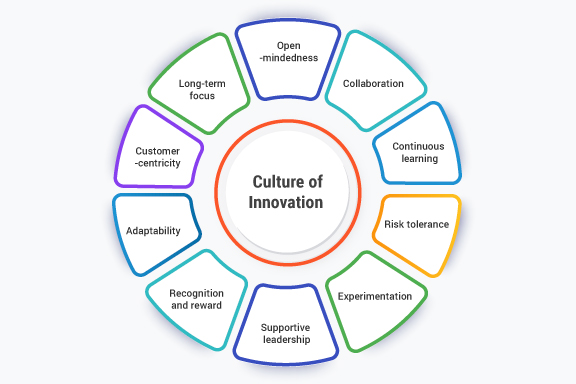In today’s fast-paced business world, it’s important for project teams to have a mindset of innovation in order to be successful and last. Innovation doesn’t just happen when one person is brilliant; it usually happens when people work together and have a safe place where creative ideas can grow. A culture that values different points of view, supports experimentation, and promotes open communication can make it much easier for a team to adapt and do well in times of change. As we talk about the different ways to encourage this culture of innovation, it is important to remember the part that education plays in developing these skills among workers, especially in the area of project management.
Understanding the Importance of Innovation
Innovation in project management means coming up with new and better ways to get things done. This could mean using new tools, making processes better, or working together as a team better. For example, a tech startup might use agile methods to encourage iterative development, which makes the project end very flexible. Innovation-focused businesses not only make their services better, but they also get an edge in the market.
Innovation can also save a lot of money and make things run more smoothly. A study by McKinsey found that companies that encourage innovation can get up to 30% more money back for their shareholders than companies that don’t. The numbers make it clear that innovation is not only good, it’s vital.
The Role of Leadership in Fostering Innovation
A culture of creation on project teams depends on leaders who are good at what they do. Leaders need to show that they value new ideas and encourage their teams to do the same. You can do this by supporting and encouraging new ideas and by giving people the tools they need to try new things. For example, Google is known for its 20% time policy, which lets workers do projects they’re really interested in during work hours. This project has led to ground-breaking new ideas like Gmail and Google Maps.
Transformational leadership is very important in this case. Being open to change and constantly looking for new ways to do things is something that leaders can do to show their teams how to act. By doing this, they encourage their team members to break the rules and go where no one has gone before.
Encouraging Collaboration and Diverse Perspectives
Collaboration is the most important thing for promoting new ideas. Putting together people from different departments, areas of knowledge, and cultures can help them come up with more ideas, which can boost creativity. Teams working on projects should hold brainstorming meetings where anyone can share their ideas without fear of being judged. This can help build a sense of safety and trust, which is important for people to be able to easily share their thoughts.
At a global company, for example, a project team might include software engineers, marketing experts, and customer service reps. The different points of view can help the team come up with new ideas that a team of people who all think the same way might miss. Using digital tools for teamwork can also help make communication smoother, especially when people work from home. This makes it easier for team members to share their ideas and improve them.
Embracing Failure as Part of the Innovation Process
Failure is a normal part of the creative process, so a setting that supports it must also be open to it. People shouldn’t feel bad about failing; instead, they should see it as a chance to learn and grow. Teams can keep working on their ideas and make them better with each setback by looking at mistakes to see what went wrong.
Take the making of the first iPhone as an example. Apple had a lot of problems and setbacks along the way, but their iterative process and desire to learn from their mistakes helped them make a product that changed the world. This approach aligns with principles taught in PMP training, where teams should enjoy both wins and losses and encourage members to share what they’ve learned, which will keep the innovation cycle going.
Integrating Learning and Development
To create a culture of creativity, it is important to keep learning. Members of the team should feel free to improve their skills and learn more about new tools and trends. Taking classes like an online graduate diploma in project management gives workers the tools and methods they need to run projects efficiently and encourages them to think of new ideas.
Giving complete project management skills at AIMS Education shows that they want to create skilled workers who are ready to take on tough problems. This training helps professionals understand different project management approaches and how to use them in the real world. It also inspires them to think of creative ways to use these strategies successfully.
Getting a project management diploma online can also help you learn more about best practices and new ways to do things. Participating in these ways of learning not only improves your own skills but also encourages new ideas that help the whole team.
Recognising and Rewarding Innovation
A spirit of innovation is strengthened by praise in a big way. People on a team are more likely to come up with new ideas and take the lead if they feel like their work is recognized. Using a reward system that emphasizes creative thinking will get people on the team to share their thoughts and answers.
For instance, a company might hold an innovation contest every three months where workers can share their ideas. The winners might get praise or even money to help them develop their ideas further. Celebrating these wins inspires others to come up with new ideas and get involved in the creative process.
Maintaining Flexibility and Agility
To be innovative, you often need to be able to quickly adjust to new knowledge and changing conditions. To stay competitive, project teams need to learn how to be flexible and quick on their feet. Being flexible lets teams change their plans and try new ones when they run into problems.
Tools like agile project management methods can help with this kind of flexibility. Agile promotes small steps forward and reviewing project goals on a regular basis, which helps teams adapt well to change. By using these methods, project teams can keep coming up with new ideas and keep moving forward throughout the whole project life cycle.
Conclusion
Creating an innovative culture in project teams takes long-term planning, a dedication to working together, being open to failure, a willingness to invest in learning, and acknowledging accomplishments. As the business world changes, encouraging new ideas is no longer just a good thing to do; it’s a must for long-term success.
As part of AIMS Education’s mission to offer professional project management qualifications, people who want to be leaders can gain the knowledge and skills they need to drive creativity. Project management education is changing all the time. Programs like the online graduate diploma of project management and the online project management certification make sure that workers are ready to take on the tough problems of today.
A commitment to a culture of innovation can help project teams find new opportunities, adapt to changing situations, and lead their companies into a future where they will not only live but also thrive.
FAQs
What is the importance of fostering a culture of innovation in project teams?
Fostering a culture of innovation is crucial as it encourages team members to share creative ideas, embrace failure as a learning opportunity, and continuously seek improvement. This environment enhances overall project outcomes and contributes to organizational growth.
How can teams effectively embrace failure in the innovation process?
Teams can effectively embrace failure by normalizing it as a part of the learning process. They should analyse what went wrong, share their experiences openly, and use the insights gained to refine their strategies, thereby promoting resilience and adaptability.
What role does training and development play in fostering innovation?
Training and development equip team members with the latest knowledge, skills, and methodologies that empower them to innovate. Engaging in courses and certifications helps professionals stay abreast of emerging trends and fosters a proactive approach to problem-solving.
How can recognition impact innovation within teams?
Recognition reinforces a culture of innovation by making team members feel valued for their contributions. When individuals receive acknowledgment for their creative ideas and efforts, they are more likely to continue to participate actively in the innovation process.
What methodologies can enhance flexibility and agility in project teams?
Utilising agile project management methodologies can significantly enhance flexibility and agility. These approaches emphasize iterative development, constant feedback, and adaptability, allowing teams to respond effectively to changes and maintain innovation momentum.
Read another article ”Emerging Trends Among Blockchain Technology Companies in 2024”




